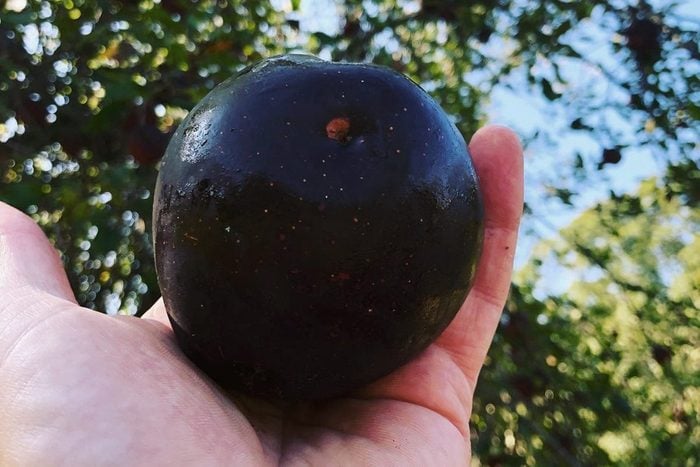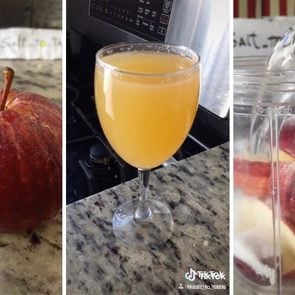Black Diamond Apples Cost at Least $7 Each—Here’s Why
Updated: Nov. 02, 2022

Both the Black Diamond apple and the Arkansas Black apple have otherworldly purple-black skin. But one type is much easier to find than the other.
Apples might just be everyone’s favorite fruit. They’re undeniably popular, starring in fall pies and crisps, galettes, and tart cider, and making cameos in Disney stories while also representing the world’s most renowned big-tech brand. Maybe you’ve even had them with a little peanut butter as one of your healthy late night snacks.
There are more than 7,500 types of apples grown around the world, but you’ll only find a dozen or so in your grocery store. Beyond the tart Granny Smith, sweet Fuji, and popular Gala, you probably haven’t tried most of the world’s apples.
And unless you’ve traveled to Tibet, chances are you haven’t taken a bite out of a rare Black Diamond apple!
Are Black Diamond apples real?
Named for its dark skin color, the Black Diamond apple breaks the red-and-green rules for most of the apples we see and eat. Though you might think this fruit resembles something from a fairy tale, we can assure you that black apples are real and safe to eat. They come from the Huaniu—or Chinese Red Delicious—apple family, and although they don’t look like your normal Gala or Honeycrisp, black apples offer a crunch that’s sweeter than your standard varietal. Check out some more facts about apples that you may not have heard before.
What is a Black Diamond apple?
This variation of apple is easily recognized by its distinct dark skin, which isn’t actually black, but a deep purple. The bold color is due to the dramatic temperature changes in the growing climate. Black Diamond apples receive large amounts of ultraviolet light exposure during the day, with extreme temperature drops at night. The result? A beautiful fruit with dark skin and a bright white pulp.
If you do get the chance to try this fruit, you’ll find that Black Diamond apples are sweeter than what you’d expect. These specific apples, though they may not look like it, have higher levels of organic sugars like glucose, making for a crisp, nectar-like bite. See the best apples for apple pie before you get cooking.
Where to buy Black Diamond apples
You won’t find these apple anomalies growing in orchards in the States, or sitting in the produce section at Trader Joe’s. Black Diamond apples are grown in Nyingchi, a small, remote city in the mountainous region of Tibet. Unless you’re able to make your way to Asia and trek up through some mountain orchards, it’s likely you won’t be able to taste this variety of apple.
How much is a Black Diamond apple?
The environment for growing Black Diamond apples is harsh, and it’s tough on the farmers who tend to them. Because of the mountainous climate, the seven to eight years it takes for Black Diamond apple trees to mature, and the fact that they grow within a very limited time window, black apples are available for only about two months every year. You can expect them to be much pricier than what you’ll find from your local grocer.
Often, Black Diamond apples are only sold in high-end supermarkets in Asia, with individual fruits selling for between $7 and $20.
What is an Arkansas Black apple?
You may not be able to buy a Black Diamond apple any time soon. But a similar type of fruit is grown in the American South, and although tart in taste, the Arkansas Black apple closely resembles the Black Diamond apple in color. This heirloom fruit was first grown in Arkansas in the 1800s, when many family farmers had apple orchards. It can be stored in a cellar for months, where the apple’s waxy skin will protect it from spoiling.
The flavor of an Arkansas Black apple is tart when first picked, but in storage, it mellows into a sweeter apple with notes of honey, vanilla, and almond.
Where to buy Arkansas Black apples
You can look for classic American heirloom apples like the Arkansas Black at small orchards and farmers’ markets, when apples are in season. You can also buy Arkansas Black apples directly from growers—or you can plant an Arkansas Black apple tree yourself! Next, learn how long your produce will really last, including all of those incredible apples.


